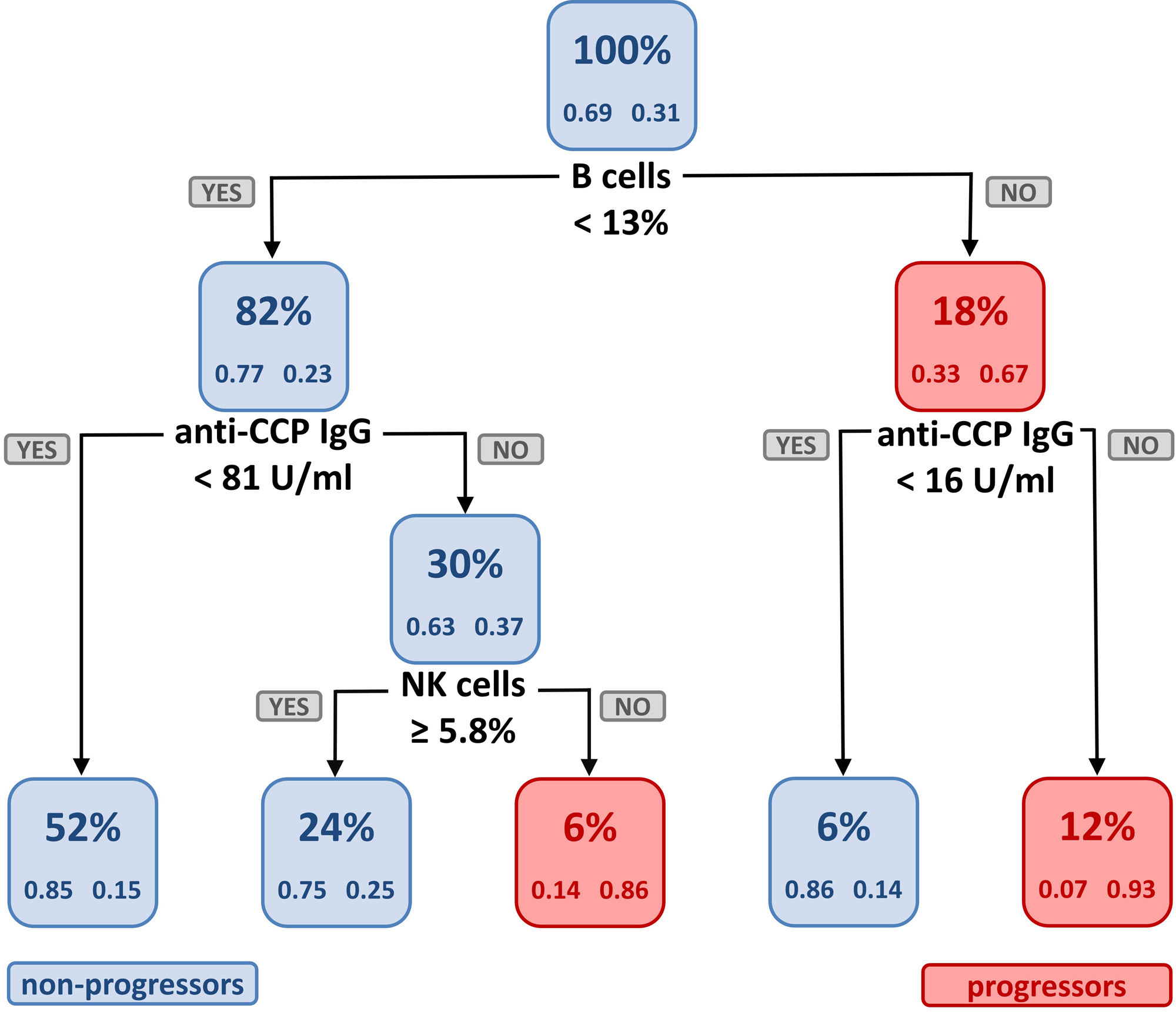Session Information
Date: Wednesday, November 15, 2023
Title: Abstracts: RA – Diagnosis, Manifestations, and Outcomes IV: Pre-RA & RA Diagnosis
Session Type: Abstract Session
Session Time: 11:00AM-12:30PM
Background/Purpose: The positivity of antibodies against citrullinated proteins (ACPA) substantially increases the risk of developing rheumatoid arthritis (RA). The definition of individuals with arthralgia at risk of progression to RA (clinically suspect arthralgia, CSA) was established by EULAR based on clinical characteristics irrespective of the ACPA. Dysregulation of lymphocyte subpopulations (including B and NK cells) was previously described in early and established RA. We aimed to propose the predictive model for progression to arthritis based on peripheral lymphocyte subsets and ACPA in at-risk individuals with arthralgia.
Methods: Individuals from the At Risk of RA (ARRA) prospective observational cohort were defined at baseline as having arthralgia without arthritis on the examination of 66 joints and being either ACPA+ and/or meeting the EULAR definition of CSA. The percentage (%) of B cells, T cells, NK cells, NK-T cells, and γδ-T cells were detected within the peripheral blood lymphocyte population using flow cytometry. A logistic regression model was constructed to discriminate between progressors to arthritis and non-progressors and evaluated using ROC curves. Moreover, a classification decision tree was built to find segments with the highest risk of progression to arthritis.
Results: Out of 191 at-risk individuals with a median of 14 months follow-up and symptom duration 13 months at inclusion, 36 developed clinical arthritis (progressors) within a median of 9 months follow-up. For the construction of predictive models, 81 individuals who have not yet progressed to arthritis (non-progressors) with symptom duration longer than 12 months were included. A logistic regression model with baseline age, body mass index, % of peripheral blood lymphocyte subpopulations, and anti-CCP and anti-MCV serum levels as predictors was constructed for the discrimination between progressors and non-progressors. The resulting predictive model for arthritis development showed in a total cohort that high anti-CCP IgG levels, high % of B cells, and low % of NK cells increase the probability of developing arthritis, particularly in ACPA+ individuals, but not in the subset of ACPA- individuals. Evaluation of this model using the ROC curve showed AUC=0.732 (p< 0.001). When the identical set of predictors was applied to ACPA+ individuals, AUC was even higher (AUC=804,p< 0.001). However, we were not able to construct a well-performing model in ACPA- individuals. The CSA definition appears of no predictive value in our cohort. The proposed classification decision tree (Figure 1) showed, that individuals with B cells over 13% and anti-CCP IgG over 16 U/ml have a higher risk (93%) of progression to arthritis.
Conclusion: We propose here a predictive model to distinguish at-risk individuals with arthralgia who progress to arthritis from non-progressors based on baseline levels of lymphocyte subpopulations and ACPA levels, especially applicable in ACPA-positive individuals. The final model includes B cells and NK cells, which are involved in the pathogenesis of RA. This is a preliminary model that requires further validation in larger at-risk of RA cohorts.
Acknowledgment: NU22-05-00226, MHCR-023728, SVV-260523
To cite this abstract in AMA style:
Prajzlerová K, Kryštůfková O, Kaspříková N, Růžičková N, Hulejová H, Hánová P, Vencovsky J, Senolt L, Filkova M. A Predictive Model for Progression to Clinical Arthritis Based on Lymphocyte Subsets and ACPA in At-risk Individuals with Arthralgia [abstract]. Arthritis Rheumatol. 2023; 75 (suppl 9). https://acrabstracts.org/abstract/a-predictive-model-for-progression-to-clinical-arthritis-based-on-lymphocyte-subsets-and-acpa-in-at-risk-individuals-with-arthralgia/. Accessed .« Back to ACR Convergence 2023
ACR Meeting Abstracts - https://acrabstracts.org/abstract/a-predictive-model-for-progression-to-clinical-arthritis-based-on-lymphocyte-subsets-and-acpa-in-at-risk-individuals-with-arthralgia/

